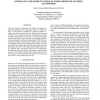Free Online Productivity Tools
i2Speak
i2Symbol
i2OCR
iTex2Img
iWeb2Print
iWeb2Shot
i2Type
iPdf2Split
iPdf2Merge
i2Bopomofo
i2Arabic
i2Style
i2Image
i2PDF
iLatex2Rtf
Sci2ools
106
click to vote
ICCAD
2003
IEEE
2003
IEEE
Optimality and Stability Study of Timing-Driven Placement Algorithms
This work studies the optimality and stability of timing-driven placement algorithms. The contributions of this work include two parts: 1) We develop an algorithm for generating synthetic examples with known optimal delay for timing driven placement (T-PEKO). The examples generated by our algorithm can closely match the characteristics of real circuits. 2) Using these synthetic examples with known optimal solutions, we studied the optimality of several timing-driven placement algorithms for FPGAs by comparing their solutions with the optimal solutions, and their stability by varying the number of longest paths in the examples. Our study shows that with a single longest path, the delay produced by these algorithms is from 10% to 18% longer than the optima on the average, and from 34% to 53% longer in the worst case. Furthermore, their solution quality deteriorates as the number of longest paths increases. For examples with more than 5 longest paths, their delay is from 23% to 35% longe...
Hardware | ICCAD 2003 | Longest Paths | Longest Paths Increases | Timing-driven Placement Algorithms |
Related Content
| Added | 16 Mar 2010 |
| Updated | 16 Mar 2010 |
| Type | Conference |
| Year | 2003 |
| Where | ICCAD |
| Authors | Jason Cong, Michail Romesis, Min Xie |
Comments (0)

